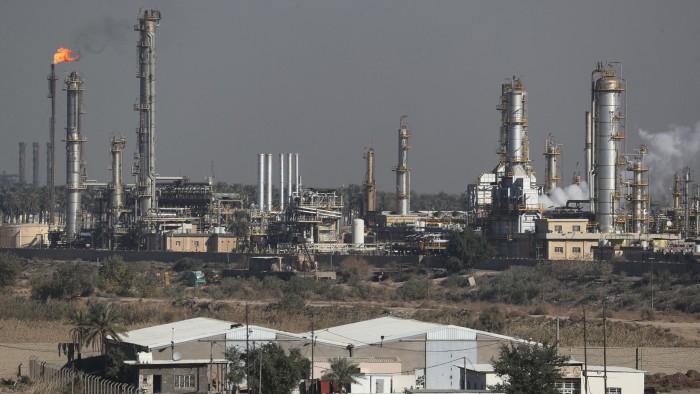Unlock the Editor’s Digest for free
Roula Khalaf, Editor of the FT, selects her favourite stories in this weekly newsletter.
Oil markets have shrugged off Israel’s threat to topple the Iranian regime, with crude exports from the Middle East so far unaffected by the escalating conflict.
Financial Times analysis of ship-tracking data shows there has been no significant impact on the movement of vessels through the critical Strait of Hormuz. Homayoun Falakshahi, head of crude oil at energy analytics firm Kpler, said their systems also showed no drop in the number of oil tankers transiting the strait.
About 21mn barrels of oil from Iran, Iraq, Kuwait, Saudi Arabia, Qatar and the United Arab Emirates pass daily through the narrow waterway separating the Islamic republic from the Gulf states, representing about one-third of the world’s seaborne oil supplies.
“The market is reassured by the fact that we have seen attacks on energy infrastructure but they were constrained to the domestic energy systems in both countries,” Falakshahi said.
Brent crude, the international oil benchmark, rose as much as 5.5 per cent early on Monday to more than $78 a barrel, before giving up all of those gains to trade down 4.1 per cent just above $71.17. It has increased less than 4 per cent since the fighting began last week.
Over the weekend Israeli Prime Minister Benjamin Netanyahu said that regime change could “certainly be the result” of Israel’s attacks on the Islamic Republic after he launched strikes against at least two Iranian gas processing plants and two fuel depots in Tehran. In response, Iran hit pipelines and transmission lines serving Israel’s largest refinery.
However, Israel has not targeted Iran’s key oil export terminals on Kharg Island and Tehran has not sought to disrupt shipping through the Strait of Hormuz.
“I think the goal from Israel is to make internal logistics more difficult for Iran, rather than to rattle international markets,” Falakshahi said.
He added that fewer tankers than normal appeared to be heading to Iran’s Kharg Island to load oil but that this is likely to be a temporary, precautionary measure, as had happened after Israel and Iran traded air strikes in October last year. One tanker loaded over the weekend but others appeared to have slowed their approach to the facility, which is responsible for 90 per cent of Iran’s oil exports, he said.
Iran currently produces about 3.2mn barrels of oil a day and exports just over half, almost exclusively to China.
While the Iranian regime has historically threatened to block the Strait of Hormuz in the event that the country is attacked, traders are betting that Tehran is less likely to seek to disrupt shipping given improved relations with Saudi Arabia and the need to keep its own exports flowing.
Tehran targeted vessels in the strait during the Iran-Iraq war in the 1980s and more recently was accused of attacks on tankers near the strait in 2019. However, it has never been able to completely block traffic. Saudi Arabia restored diplomatic ties with Iran in 2023.
“Although there is concern that a broader conflict could cause the strategically critical Strait of Hormuz to close, [we] consider this risk as very low given it has never occurred in history,” JPMorgan’s commodities team wrote in a note.
The UK’s Maritime Trade Office on Monday said there had been a slight decrease in the number of large cargo ships transiting the strait over the past week but added that it identified no information pointing towards a blockade or closure.
Janiv Shah, an oil analyst at consultancy Rystad Energy, said a blockade would push markets into “uncharted territory”, but that this was an unlikely outcome.
Rather than shutting the strait, an alternative Iranian response could lead to Tehran seeking to strike oilfields in Saudi Arabia and Iraq, which are within the reach of its drones, say analysts.
In 2019 Iran was widely believed to be behind a drone attack on Saudi Arabia’s largest oil processing facility that temporarily cut the kingdom’s crude production by more than half and briefly pushed up global oil prices by as much as 20 per cent.
However, traders are betting that any such action will come into play only as a very last resort, according to Falakshahi.
“Currently no actor in the region, especially the two currently involved in the conflict, sees a benefit in hitting critical energy infrastructure,” he said.
Read the full article here




